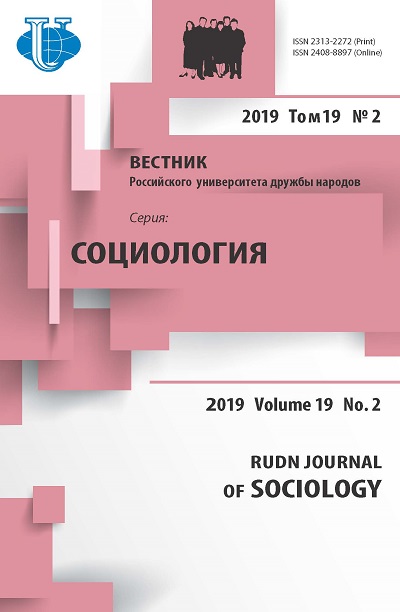Religious harmony and tolerance of the urban residents of Kazakhstan: Results of the sociological research
- Authors: Shabdenova AB1, Alimbekova GT2
-
Affiliations:
- Al-Farabi Kazakh National University
- Center for Study of Public Opinion
- Issue: Vol 19, No 2 (2019)
- Pages: 302-312
- Section: Surveys, experiments, case studies
- URL: https://journals.rudn.ru/sociology/article/view/21102
- DOI: https://doi.org/10.22363/2313-2272-2019-19-2-302-312
Cite item
Full Text
Abstract
Researchers believe that in recent decades in Kazakhstan the religious situation has changed, which was manifested in an increase of the number of believers who follow religious precepts and build their lifestyle according to them. Kazakhstan is a multi-ethnic country, where representatives of different ethnic and religious groups live. It is important to study the level of tolerance and religious harmony between different social groups. The article presents the results of the sociological study of tolerance and religious views in Almaty - the most populated city of Kazakhstan - based on the method of individual standardized interview. The results of the survey show the prevalence of tolerant relations for the majority of respondents said that they had not experienced any problems or insult based on their religious views. At the same time, the refusal to accept a person of another religion or other religious views as a member of one’s family is more typical for Moslems, namely of Kazakh and Uzbek ethnicity, and also for people with a low level of education and low incomes of the household. On the one hand, there is a clear desire for religious harmony; on the other hand, there are transformations of religious practices based not so much on the phenomenon of faith but on national traditionalism. The results of the survey prove that level of religious harmony is influenced to a certain extent by social-economic conditions.
About the authors
A B Shabdenova
Al-Farabi Kazakh National University
Author for correspondence.
Email: aija2005@mail.ru
-
Al-Farabi Ave., 71, Almaty, Kazakhstan, 050040G T Alimbekova
Center for Study of Public Opinion
Email: welcome@ciom.kz
-
Zhibek Zholy St., 54, Almaty, Kazakhstan, 050002References
- Abdirayymova G.S., Alimbekova G.T., Verevkin A.V., Lifanova T.Yu., Shabdenova A.B. Sotsialnoe samochuvstvie kazakhstantsev: sotsiologicheskoe izmerenie [Social Well-Being of Kazakhstani People: A Sociological Dimension]. Almaty; 2015 (In Russ.).
- Garadzha V.I. Sociologiya religii [Sociology of Religion]. Moscow; 1995 (In Russ.).
- Zhusupova A. Dinamika sotsialnogo neravenstva v Kazakhstane [Dynamics of Social Inequality in Kazakhstan]. Almaty; 2016 (In Russ.).
- Zborovsky G.E. Obshchaya sotsiologiya [General Sociology]. Moscow; 2004 (In Russ.).
- Ivleva M.L., Kurilov S.N., Rossman V.I. Religioznye tsennosti glazami molodezhi: opyt sotsiologicheskogo issledovaniya [The youth’s perception of religious values: A sociological study]. RUDN Journal of Sociology. 2018; 18 (3) (In Russ.).
- Mezhkonfessionalnye otnosheniya [Interfaith relations]. http://personal.akorda.kz/ru/category/ mezhkonfessionalnye-otnosheniya (In Russ.).
- Narbut N.P., Trotsuk I.V. Sotsialnoe samochuvstvie molodezhi postsotsialisticheskikh stran (na primere Rossii, Kazakhstana i Chekhii): sravnitelny analiz tsennostnykh oriyentatsiy (Chast 1) [The social well-being of the post-socialist countries’ youth (on the example of Russia, Kazakhstan and Czech Republic): Comparative analysis of value orientations (Part 1)]. RUDN Journal of Sociology. 2018; 18 (1) (In Russ.).
- Narbut N.P., Trotsuk I.V. Sotsialnoe samochuvstvie molodezhi postsotsialisticheskikh stran (na primere Rossii, Kazakhstana i Chekhii): sravnitelny analiz strakhov, nadezhd i opaseniy (Chast 2) [The social well-being of the post-socialist countries’ youth (on the example of Russia, Kazakhstan and Czech Republic): Comparative analysis of fears and hopes (Part 2)]. RUDN Journal of Sociology. 2018; 18 (2) (In Russ.).
- Rysbekova Sh.S. Deyatelnost' Russkoy Pravoslavnoy Tserkvi v postsovetskiy period v Kazakhstane [Activities of the Russian Orthodox Church in the post-Soviet period in Kazakhstan]. KazNU Bulletin. Religious Studies Series. 2015; 1 (In Russ.).
- Tikhonova N.E. Sotsialnaya struktura Rossii: teorii i realnost [Social Structure of Russia: Theories and Reality]. Moscow; 2014 (In Russ.).
- Chislennost naseleniya Respubliki Kazakhstan po oblastyam, gorodam i rayonam na 1 yanvarya 2018 goda [Population of the Republic of Kazakhstan by regions, cities and districts as of January 1, 2018]. Demograficheskaya statistika. 2018; 21 Series (In Russ. and Kazakh).
- Shabdenova A.B., Alimbekova G.T. Uroven religioznosti semey s razlichnym statusom: rezultaty sotsiologicheskogo issledovaniya [The level of religiosity of families with different status: Results of the sociological research]. KazNU Bulletin. Psychology and Sociology Series. 2016; 4 (In Russ.).
- Shaukenova Z.K. Akt chelovechnosti i miloserdiya [Act of humanity and mercy]. http://kisi.kz/index.php/ru/publikatsii/25-shaukenova-zarema-kaukenovna/1553-akt-chelovechnosti-i-miloserdiya.
- Shaukenova Z.K., Burova E.E., Bektenova M.K. Fenomen religioznosti v sovremennom Kazakhstane (sotsiologicheskiy vzglyad) [The phenomenon of religiosity in contemporary Kazakhstan: A sociological perspective]. KazNU Bulletin. Religious Studies Series. 2015; 1 (In Russ.).
- Abdiraiymova G.S., Kenzhakimova G.A., Verevkin A.V., Lifanova T.Y., Burkhanova D.K. Higher education in Kazakhstan: New opportunities and the problem of crystallization of middle strata status. Procedia - Social and Behavioral Sciences. 2015. Vol. 177.
- Seguillon P.L. Kazakhstan Pivot de l’Eurasie. Paris, 2010.
- Shabdenova A.B., Verevkin A.V. Single parents in transformation: A social research. Teorija in praksa. 2018. No. 3.














